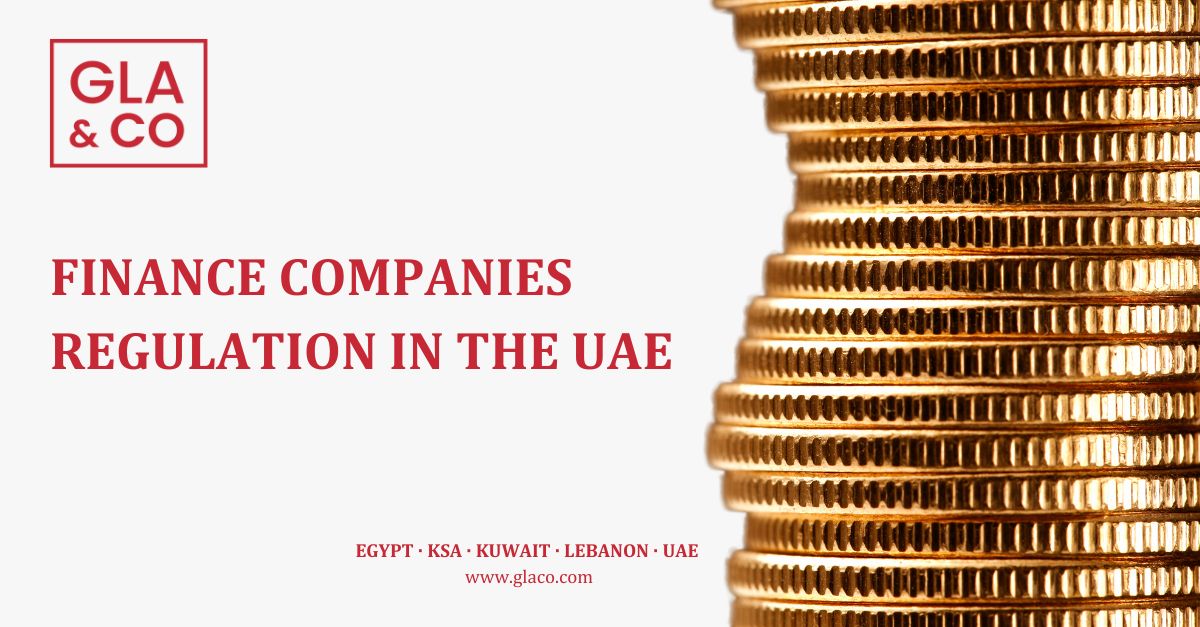
Finance Companies Regulation in the UAE
Introduction
The Central Bank of the United Arab Emirates (“CBUAE”) has issued a new regulation to govern finance companies and restricted license finance companies by virtue of Circular No. 3 of 2023 (“Regulation”). The Regulation aims to enhance the regulatory framework for finance companies, promote financial stability and consumer protection, and align with international best practices.
Scope of Regulation
The Regulation applies to all finance companies and restricted license finance companies operating in the UAE, as well as their agents and representatives. The Regulation also defines the roles and responsibilities of the CBUAE, the licensees, and the consumers in relation to the provision of financing activities.
In this respect, the Regulation provides that the CBUAE has the authority to:
- conduct periodic examinations on finance companies to ensure compliance with UAE laws and regulations and can take supervisory action and impose administrative and financial sanctions for violations of the Regulation; and
- require finance companies to submit reports and maintain records in prescribed formats and timeframes and must approve any changes in the finance company’s ownership, senior management, or capital.
Main Feature of the Regulation – Restricted Licence Finance Companies
A new category of finance companies was introduced by the Regulation; namely, Restricted Licence Finance Companies, that are allowed to provide short-term credit to individuals and businesses, which in its turn is defined as any financing with a maturity of less than one year, such as payday loans, overdrafts, and invoice financing.
Licensing
To operate as a Restricted Licence Finance Company, an entity must obtain a license from the CBUAE, following a detailed application process.
A Restricted Licence Finance Company must satisfy certain requirements including but not limited to:
- an Aggregate Capital Funds of the higher of AED 20 million or 5% of outstanding lending volume;
- maintain physical presence in the UAE; and
- its legal form must be in one of the forms stipulated in the Commercial Companies Law.
It is worth highlighting that the Regulation further defines the Aggregate Capital Funds to include the following items:
- Paid-up capital;
- Reserves, excluding revaluation reserve; and
- Retained earnings.
Deduct the following items:
- Accumulated losses; and
- Goodwill,
Further, it is worth noting that the company’s commercial or trade name must comply with the restrictions of the Central Bank Law and not include any term that may indicate any activity other than the provision of short-term credit.
The applicant must submit a form prescribed by the CBUAE, along with all the required information and documents, including inter alia, the following documents:
- the sources of funding;
- the business plan; and
- the governance arrangements.
The CBUAE has further facilitated the application process by allowing the submission of the application and the supporting documents in either Arabic or English, noting that any financial figures must be in UAE Dirham (AED).
Any subsequent changes to the name, legal form, memorandum, or articles of association shall be subject to the prior approval of the CBUAE.
Post-licensing requirements
A Restricted Licence Finance Company must commence the provision of short-term credit within a maximum of 12 months from the date of notification of approval of the license. If the company intends to amend, cease, or suspend the provision of short-term credit, it must apply to the CBUAE at least six months in advance, providing the reasons for such cessation or suspension.
The Regulation provides that any person who is engaged in financing activities and is not licensed by the CBUAE, must within ninety (90) days as of the date of publishing the Regulation (i.e., 29 September 2023), apply to the CBUAE for a license or immediately cease undertaking all financing activity.
How can we help?
GLA is delighted to assist the companies to obtain and maintain the licences from the CBUAE and advise the companies on the compliance with the organizational policies and procedures, such as the segregation of duties, the Fit and Proper framework, and the approval of any changes to the company’s name, legal form, or articles of association.
Authors: Hegui Taha, Partner
For further information, please contact Alex Saleh (alex.saleh@glaco.com) or Yousef Alamly ( y.alamly@glaco.com )

